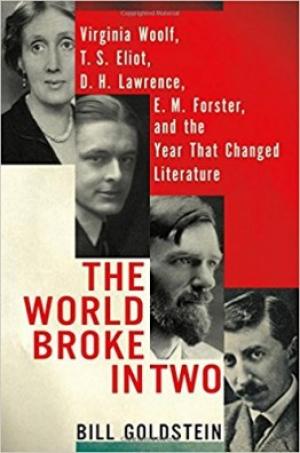Join us for a lecture, discussion, and reception with public humanist and author Bill Goldstein about his new book The World Broke in Two: Virginia Woolf, T. S. Eliot, D. H. Lawrence, E. M. Forster and the Year That Changed Literature, published by Henry Holt on August 15, 2017.
Willa Cather wrote in 1936, "The world broke in two in 1922 or thereabouts." The publication of James Joyce's UIysses in February and T. S. Eliot's The Waste Land in October quickly gave 1922 a privileged place in the history of literary modernism. But for Woolf, Eliot, Lawrence and Forster, the literary apocalypse of 1922 had less to do with publication dates than with the personal and creative challenges explored in this talk.
At the start of the year, each was a writer in deep despair about an uncertain creative future. By the end of the year each had done work that transformed them as writers: Woolf had written "Mrs. Dalloway in Bond Street," the story that grew into the novel Mrs. Dalloway; Forster had made his first substantial progress in nearly a decade on the novel that would become A Passage to India; Lawrence wrote his most experimental and autobiographical novel Kangaroo; and Eliot had completed and published The Waste Land -- though the drama of the year for him had less to do with the poem's appearance than with how close he had come to not finishing it or having it published at all. Key to what these writers wrote is what they read, in particular Joyce's Ulysses, but even more crucially, Proust's A la recherche du temps perdu, a substantial -- and immediate -- influence on Woolf and Forster that The World Broke in Two delineates for the first time.
Goldstein will discuss, among other issues, how the specters of Ulysses, In Search of Lost Time and The Waste Land itself shaped Woolf's ideas of form and structure; why the seizure of Lawrence's Women in Love by the New York Society for the Suppression of Vice in July 1922 led to a landmark legal decision prefiguring the decision in the Ulysses case a decade later; and how, most significantly, the lingering impact of World War One on English life is reflected in the work this quartet of writers did in 1922.
Sponsored by the University of Michigan Library, the U-M Institute for the Humanities, the U-M Department of English Language and Literature, the Rackham Interdisciplinary Workshops on Critical Contemporary Studies and Pre-Professional Humanists, and Literati Bookstore.
Willa Cather wrote in 1936, "The world broke in two in 1922 or thereabouts." The publication of James Joyce's UIysses in February and T. S. Eliot's The Waste Land in October quickly gave 1922 a privileged place in the history of literary modernism. But for Woolf, Eliot, Lawrence and Forster, the literary apocalypse of 1922 had less to do with publication dates than with the personal and creative challenges explored in this talk.
At the start of the year, each was a writer in deep despair about an uncertain creative future. By the end of the year each had done work that transformed them as writers: Woolf had written "Mrs. Dalloway in Bond Street," the story that grew into the novel Mrs. Dalloway; Forster had made his first substantial progress in nearly a decade on the novel that would become A Passage to India; Lawrence wrote his most experimental and autobiographical novel Kangaroo; and Eliot had completed and published The Waste Land -- though the drama of the year for him had less to do with the poem's appearance than with how close he had come to not finishing it or having it published at all. Key to what these writers wrote is what they read, in particular Joyce's Ulysses, but even more crucially, Proust's A la recherche du temps perdu, a substantial -- and immediate -- influence on Woolf and Forster that The World Broke in Two delineates for the first time.
Goldstein will discuss, among other issues, how the specters of Ulysses, In Search of Lost Time and The Waste Land itself shaped Woolf's ideas of form and structure; why the seizure of Lawrence's Women in Love by the New York Society for the Suppression of Vice in July 1922 led to a landmark legal decision prefiguring the decision in the Ulysses case a decade later; and how, most significantly, the lingering impact of World War One on English life is reflected in the work this quartet of writers did in 1922.
Sponsored by the University of Michigan Library, the U-M Institute for the Humanities, the U-M Department of English Language and Literature, the Rackham Interdisciplinary Workshops on Critical Contemporary Studies and Pre-Professional Humanists, and Literati Bookstore.
| Building: | Hatcher Graduate Library |
|---|---|
| Website: | |
| Event Type: | Lecture / Discussion |
| Tags: | Discussion, Free, Library, Literature |
| Source: | Happening @ Michigan from University Library, Department of English Language and Literature |


